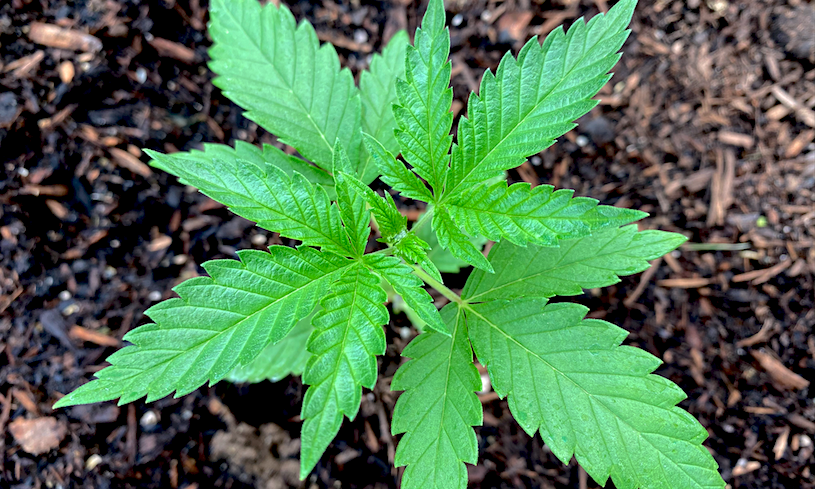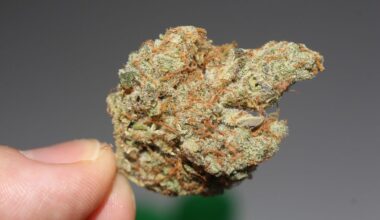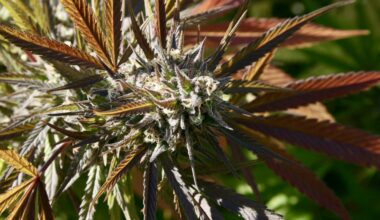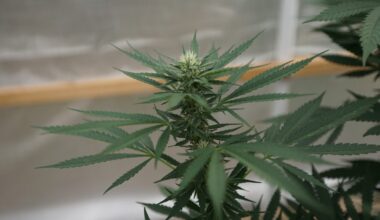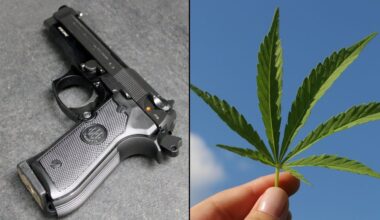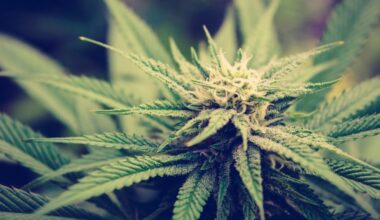The Biden administration’s interior secretary says she understands the need to take an “administrative approach” when it comes to Tribal sovereignty and federal marijuana enforcement, stressing that her department is “not ignoring” requests to exercise discretion so that tribes are able to set their own cannabis policies without undue interference.
Interior Secretary Deb Haaland, who is the first Native American to serve in a cabinet position, was pressed on the issue at a hearing before a Senate Appropriations subcommittee on Wednesday. Sen. Martin Heinrich (D-NM) criticized the use of departmental funds to interfere in Tribal marijuana program, especially given the need to prioritize combating violent crime and solving cases of missing Indigenous people.
He specifically referenced a Bureau of Indian Affairs (BIA) raid of a small, home cannabis garden of a medical marijuana patient last year on Tribal land in his state of New Mexico. The governor of Pueblo of Picuris told Marijuana Moment at the time that he felt the action by BIA, which falls under Interior, represented a federal double standard in cannabis enforcement.
“Why, instead of focusing on this crisis [of violent crime] that is truly a crisis, are limited BIA resources being used to enforce federal cannabis laws on reservations where cannabis has already been legalized by the sovereign tribe?” the senator asked the secretary.
Haaland said that she believes “very strongly that we should respect Tribal laws and work in partnership with tribes on their public safety priorities,” adding that tribal communities understand the unique challenges that they face and where resources should be allocated.
Watch the senator and secretary discuss Tribal marijuana policy and federal enforcement priorities in the video below, starting at 1:13:37:
“Of course, this question also involves the authority and policy of the Department of Justice, and I respect that we have to have an administrative approach to this,” the secretary said. “So it’s absolutely noted. We have been approached by tribes on this issue as well, and so it’s something that we are not ignoring.”
Heinrich said that he appreciated the response, reiterating that he feels that interfering in tribal marijuana programs is a “horrible misappropriation of focus at a time when we have such pressing needs.”
“Obviously, in my state, the state has chosen to legalize cannabis. A number of tribes have followed suit,” he said. “Whatever you think about that as a policy matter, we have such more important, pressing criminal needs in Indian country right now that we need to set our priorities appropriately.”
As part of Fiscal Year 2023 spending legislation for Interior, House appropriators did include language in the base bill to provide protections for Indian tribes against being federally prosecuted simply because they’ve legalized marijuana within their territory.
The language is somewhat similar to previous sections attached to different spending measures as amendments that have pushed to give cannabis safeguards to tribes. However, the latest section comes with contingencies not seen before, including a policy stating that tribes in states that haven’t legalized marijuana wouldn’t be covered under the protections.
Overall, the provision says that no federal funds appropriated to agencies within Interior, Justice Department, Bureau of Indian Affairs or Office of Justice Services could be used to “enforce federal laws criminalizing the use, distribution, possession, or cultivation of marijuana against any person engaged in the use, distribution, possession, or cultivation of marijuana in Indian country” where such activity is authorized.
But it’s not an all-encompassing protection, as the section goes on to say that the policy is “subject” to two exceptions.
First, federal funds could still be used to interfere in tribal cannabis activity if the territory is located within a state that maintains prohibition, for example.
Indian tribes must also take “reasonable measures under tribal marijuana laws to ensure that marijuana is prohibited for minors; marijuana is not diverted to states or tribes where marijuana is prohibited by state or tribal law; marijuana is not used as a means for trafficking other illegal drugs or used to support organized crime activity; and marijuana is not permitted on Federal public lands.”
Previous provisions attached to House-passed appropriations bills covering the Commerce, Justice, Science, and Related Agencies (CJS) simply prohibited the use of federal funds to enforce criminalization on native lands where cannabis has been legalized, without either nuance about state law or policy guidelines. That only applied to DOJ funds, however, whereas this new legislation covers multiple agencies of jurisdiction. None of those measures have ever been enacted into law despite passing the House.
“Enforcing Federal cannabis laws on Tribal land, especially in cases where the Tribe and the State have legalized cannabis use, is wrong and it needs to stop,” Rep. Dave Joyce (R-OH), a co-chair of the Congressional Cannabis Caucus who serves as ranking member on the Appropriations Subcommittee on Interior, Environment and Related Agencies, said in a press release last month.
“These misguided enforcement actions have sent a chill through Indian Country—Tribes are unsure if the federal government will continue to enforce and prioritize federal marijuana laws only on reservations,” he said. “That’s why I worked closely with the Chair to include this important language to prevent Interior and Justice entities from enforcing federal marijuana laws inconsistent with tribal laws. Tribes are sovereign nations, and they have just as much of a right to enact and enforce their own laws as States do.”
At a congressional hearing in April, Joyce also raised the issue with Haaland.
“Tribes have authority to make marijuana legal in their reservations under tribal law,” the secretary told the senator. “Although I cannot change the federal law, I understand the issue,” adding that part of the issue also comes down to DOJ, which she does not control.
“I understand what tribes are saying, and I generally, of course, respect tribal laws,” the secretary said. “We want to work in partnership with tribes on any public safety issues and their priorities.”
Last month, a Senate committee held a listening session to broadly address marijuana issues for Indian tribes, discussing relevant legislation and the importance of Tribal sovereignty with respect to cannabis.
Members of the Senate Indian Affairs Committee, chaired by Sen. Brian Schatz (D-HI), heard testimony from numerous representatives of Indian tribes and trade associations across the country, including the Suquamish Tribe, Pueblo of Laguna, Kumeyaay Nation, Puyallup Tribe and Santee Sioux Tribe.
While many of the conversations focused on tribal-specific policies and issues such as taxation and tribal contracts with state governments, there were also several witnesses who stressed the need for a comprehensive end to federal prohibition to uplift tribal markets.
In March, a coalition of nine U.S. senators sent a letter to Attorney General Merrick Garland, urging him to direct federal prosecutors to not interfere with marijuana legalization policies enacted by Native American tribes.
The letter requested that the Justice Department “respect the inherent sovereignty of Tribal governments and cease the enforcement of the Controlled Substances Act on Tribal land as it pertains to the growth, possession, and use of cannabis for medicinal, agricultural, and recreational purposes, where those Tribes have legalized this activity for its own members and those acting in compliance with Tribal law.”
There was previous Obama-era DOJ guidance on prosecutorial discretion for tribal governments that opted to legalize cannabis. But that guidance, known as the Wilkinson Memo, was rescinded by then-Attorney General Jeff Sessions in 2018, along with a separate memo urging prosecutors not to go after states that established regulated cannabis markets.
The senators urged the attorney general to “reinstate prosecutorial discretion and allow U.S. Attorneys to deprioritize cannabis enforcement where states and Tribes have legalized cannabis.”
While the tribe-specific DOJ guidance was rescinded, the federal government has generally taken a hands-off approach to marijuana enforcement in states that have chosen to legalize the plant—with a glaring exception being last year’s BIA raid in Pueblo of Picuris.
Meanwhile, the Pueblos of Pojoaque and Picuris signed an intergovernmental cooperative agreements with New Mexico’s government in May that allows the tribes to impose their own tax on cannabis products sold within their tribal jurisdictions.
Other states like Washington similarly allow Native tribes to enter into intergovernmental agreements that would authorize Indian territories to enact their own regulations, penalties and tax policies for cannabis.
Medical Disclaimer:
The information provided in these blog posts is intended for general informational and educational purposes only. It is not a substitute for professional medical advice, diagnosis, or treatment. Always seek the advice of your physician or other qualified healthcare provider with any questions you may have regarding a medical condition. The use of any information provided in these blog posts is solely at your own risk. The authors and the website do not recommend or endorse any specific products, treatments, or procedures mentioned. Reliance on any information in these blog posts is solely at your own discretion.
